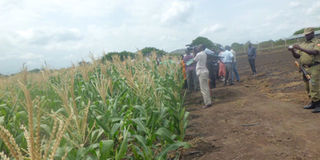New maize varieties to boost yields

A group of parliamentarians on a tour of maize field trials in Kasese. Uganda has released new varieties that are able to achieve high yields in drought conditions.
PHOTO BY LOMINDA AFEDRARU
What you need to know:
New maize varieties released in Uganda, and there is evidence to show they will perform very well.
Farmers in Uganda now have higher chances of increasing yields even in the light of predicted drought conditions, with the new drought-tolerant maize hybrids.
The Ministry of Agriculture through its National Variety Release Committee has approved the release of four hybrids, WE2101, WE2103, WE2104 and WE2106.
This, is in addition, to the two hybrids, WE2114 and WE2115, which were released last year. The hybrids will be sold under the trade name DroughtTEGO and once commercialised; farmers can expect a yield increase of between 20-35 per cent compared with the commercial hybrids released in 2008.
The hybrids are developed by the Water Efficient Maize for Africa (Wema) project, a public-private partnership dedicated to delivering drought-tolerant and insect-pest protected seed to smallholder farmers in Sub-Saharan Africa.
Good results
The project is coordinated by African Agricultural Technology Foundation (AATF), a regional organisation which is headquartered in Nairobi, Kenya.
Last year, Kenya commercialised one of the DroughtTEGO hybrids, the WE1101 and farmers who planted it harvested substantial yields in January 2014.
Among 39 sites in western Kenya initially surveyed by AATF, DroughtTEGO resulted in an average harvest of 4.5 tonnes per hectare. This is more
than double the national average of 1.8 tonnes per hectare in Kenya.
Likewise, such results are expected when Ugandan farmers adopt the new varieties.
More than five seed companies in Uganda have applied for sub-licenses to increase the production of the seed so as to enhance the availability for purchase by farmers in the next seasons.
Approved
“We are seeking the best ways to obtain greater seed production, distribution and use, so Wema is working with private seed companies to deliver at least 10,000 metric tonnes of certified seeds produced from at least 25 conventional drought-tolerant hybrids within the next four years,” says Dr Sylvester Oikeh, the Wema Project Manager.
To date, a total of 25 Drought TEGO hybrids have been approved for commercialisation in Kenya, Tanzania and Uganda.
More than 30 new hybrids have been entered into the final phase of variety registration in the five participating WEMA countries (Kenya, Uganda, Tanzania, Mozambique and South Africa) for potential release by 2015.
Excellent example
“After a six-year development process, we are very encouraged by the results of the first Drought TEGO harvest,” said Denis Kyetere, executive director of AATF.
“The Wema partnership is an excellent example of what can be accomplished when public and private organisations work together for a common good, providing powerful new tools to help farmers overcome climate change challenges and increase food production.”
These results demonstrate the power of advanced breeding tools to help the farmers of Sub-Saharan Africa, an area that is prone to drought and facing increased crop volatility due to climate change.
More than 90 percent of smallholder farmers in Africa depend solely on rainfall to maintain their crops.
ABOUT THE WEMA PROJECT
Water Efficient Maize for Africa (Wema) is a public-private partnership led by African Agriculture Technology Foundation (AATF).
It includes Monsanto, International Wheat and Maize Improvement Centre (CIMMYT), and five national agricultural research systems in Uganda, Kenya, Tanzania, Mozambique and South Africa.
The objective is to improve food security and rural livelihood among smallholder maize farmers by developing new drought-tolerant and insect pest-protected maize hybrids.
Wema provides the technology royalty-free to all African seed companies to, in turn, benefit the farmers.
The project also helps build technical capacity as well as seed systems in Africa. WEMA is funded by the Bill and Melinda Gates Foundation, the Howard G. Buffett Foundation and US Agency for International Development.




